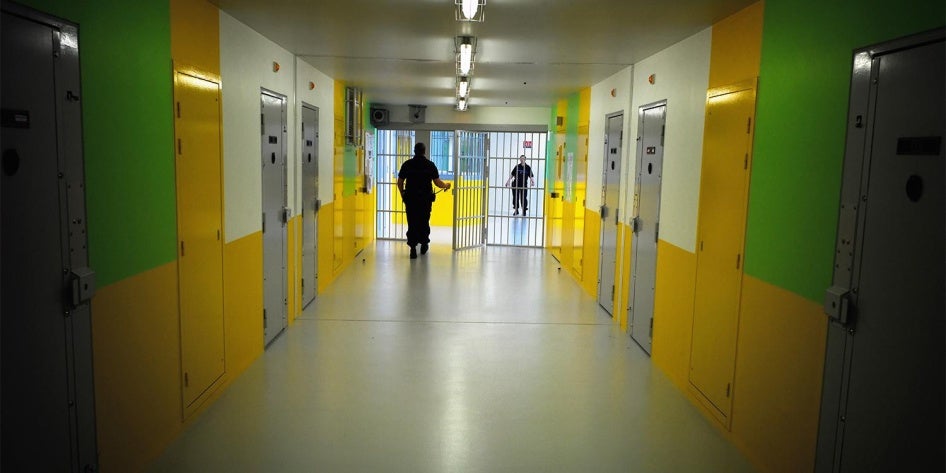(Paris) – Thousands of men and women with psychosocial disabilities in French prisons are at risk of suicide or harming themselves because of the neglect of their physical and mental health, Human Rights Watch said in a report released today.
The 69-page report, “Double Punishment: Inadequate Conditions for Prisoners with Psychosocial Disabilities in France,” documents the lack of adequate mental health care and appropriate conditions for prisoners with psychosocial disabilities. The situation is exacerbated by overcrowding, stigma, and isolation, Human Rights Watch found. A shortage of mental health professionals in many prisons means that appointments are infrequent and often brief and limited to prescribing medication. The lack of adequate conditions and care also results in difficult working conditions for prison staff.
“It’s shameful for a country like France to keep people with mental health conditions locked up for months or years in prisons without adequate access to mental health care,” said Izza Leghtas, Western Europe researcher at Human Rights Watch. “The lack of adequate mental health treatment effectively amounts to additional punishment for prisoners who need this care.”
Human Rights Watch interviewed 50 prisoners, prison staff, and medical professionals in eight prisons, as well as government officials and others.
When their condition deteriorates, prisoners with psychosocial disabilities are in some cases transferred to psychiatric hospitals against their will and isolated in conditions that can constitute cruel, inhuman, or degrading treatment under international law, Human Rights Watch found.
“I prefer 1,000 times to be in a cell than in an isolated room in the hospital, my arms and feet tied down as if I were an animal,” said Sarah (pseudonym), a prisoner who has previously been sent to psychiatric hospitals.
Return to the prison environment – without adequate support or appropriate accommodations – can lead to a recurrence of mental health conditions and re-hospitalization, sometimes ensnaring prisoners in an endless cycle of hospitalization, discharge, deterioration, and re-hospitalization. Such a cycle is both harmful to the patient’s health and disruptive and costly to the prison and the hospital involved.
Suicide rates in French prisons are higher than in the general population – seven times as high, according to a study of suicides from 2006 to 2009 by the National institute for demographic studies. But prisoners with psychosocial disabilities are more likely to harm themselves or commit suicide than other prisoners. According to the French government, there were 113 suicides in French prisons in 2015.
Sarah, who had scars from self-inflicted wounds on her arms, said people she had met in prison later committed suicide, “So of course I thought, if she can’t cope, will I be able to?” she said.
The last comprehensive study of mental health in French prisons was published in 2004. It found that almost a quarter of inmates had psychosis – which can include depression, bipolar disorder, or schizophrenia – much higher than the 0.9 percent among the general population. A frequent explanation is that judges and juries have viewed people with psychosocial disabilities as more dangerous than others and handed down longer sentences.
A 2014 law seeking to rectify that tendency provides that sentences should be reduced by one-third for defendants whose state of mind during a crime was compromised by a mental health condition.
Adeline Hazan, France’s general inspector of all places of deprivation of liberty, expressed to Human Rights Watch her concerns about the high number of prisoners with psychosocial disabilities and the lack of appropriate mental health care.
The overcrowding in French prisons – 178 percent of capacity in one prison Human Rights Watch visited – creates difficult working conditions for prison guards who can be responsible for up to 100 prisoners each. They have little time to respond to requests from individual prisoners or to notice signs of mental health conditions. Guards also lack training on mental health, and overcrowding is an obstacle to their ability to attend training that may be available.
Human Rights Watch found particularly harsh conditions for women prisoners. To avoid any contact between men and women, prison officials often restrict women prisoners’ movements more than men’s, making women feel even more isolated. Female prisoners also face discrimination in their access to mental health care. Only one of 26 specialized mental health care units in French prisons has beds for women.
As a party to the European Convention on Human Rights, France has a duty to ensure that prisoners are detained “in conditions which are compatible with respect for [their] human dignity” and that they are not subjected to hardship or distress beyond “the unavoidable level of suffering inherent in detention,” according to the case law of the European Court of Human Rights.
The Convention on the Rights of Persons with Disabilities, which France has ratified, requires French authorities to provide people with disabilities with the highest attainable level of health without discrimination on the basis of their disability, and to provide reasonable accommodation – or appropriate modifications to access services or support. France has also ratified the Convention on the Elimination of Discrimination against Women, which prohibits discrimination on the basis of gender.
The French government should commission a new independent study of the mental health of prisoners and publish more accurate figures on the number of people with psychosocial disabilities in French prisons, Human Rights Watch said. The government should provide appropriate living conditions and ensure that no prisoner with a psychosocial disability is in solitary confinement. France should also address the shortage of mental health professionals in prisons and improve their working conditions.
“Dostoyevsky said that you can judge a society by entering its prisons,” Leghtas said. “France has the means to provide dignified conditions to those in prison and can and should do much better when it comes to the way it treats prisoners with psychosocial disabilities.”










